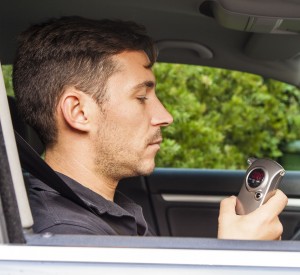
If a group of Minnesota lawmakers get their way, every single Minnesotan convicted of drunken driving would be required to install an ignition interlock device in their vehicle in order to get back behind the wheel.
For those of you unfamiliar with the devices, an ignition interlock system is a device that hooks up to a car’s ignition such that the car will not start unless the driver can prove they are under a set blood-alcohol limit. The driver proves they are sober by blowing into the unit, which then measures the alcohol content of the person’s breath. Some of the more advanced devices also take a picture of the person blowing into the unit to ensure someone else isn’t blowing for the driver.
Under the current law in Minnesota, only drivers with at least three DUIs on their record are required to equip the devices on their vehicle. Individuals with two or fewer DUIs can install the devices on their vehicles under a complex set of rules to avoid losing their license, but the new bill wants to lower the mandatory threshold. Backed by three legislators and the group Mothers Against Drunk Driving, the bill aims to require interlock devices for all DUI offenders.
Art Morrow, executive director for MADD in Minnesota, said that by ensuring every DUI offender is required to equip their vehicle with the device, “people who have poor judgment won’t even have the opportunity to drive impaired.”
Mandatory Ignition Interlock
In a news conference about the bill, Marrow noted that Minnesota would be the 25th state to reduce the mandatory ignition interlock threshold, and those states have seen a noticeable reduction in alcohol-related traffic deaths. Statistics also suggest the devices have prevented 1.77 million attempts to drive drunk in Minnesota to date.
The bill states that any DUI offender would need to have the device installed in their vehicle for at least a year and wouldn’t be able to remove them until they’ve gone at least 180 days without setting off the device with an impaired result. Supporters believe the penalty is appropriate yet short enough that offender won’t try to get around the law.
“We’re trying to hit that sweet spot so that people will actually do it” rather than skirt the law by finding another car, said Rep. Kim Norton, DFL-Rochester, who supports the bill.
The bill is grounded in good intentions, but at a point we’re over-criminalizing someone who made a poor decision. A lot of people booked for DUI are just like you or me. They had two beers at dinner or a mimosa with brunch and didn’t realize they were over the legal limit. Sure, there are always going to be those drivers who are fall over drunk who blow four times the legal limit, but there are plenty of offenders who just made a simple mistake.
They are already subjected to the loss of their driver’s license, fines, court costs, attorney fees, the cost of alcohol/substance abuse counseling and likely some probation and community service. If all those hurdles aren’t going to stop a person from getting back behind the wheel while drunk, will a mandatory ignition interlock device really make the difference? If it doesn’t, we’re just adding installation costs and monthly service fees to an already hefty bill. I know the new law states that it would look to divert some current drunken driving fines towards helping offenders pay for the device, but at the end of the day, if someone wants to drive drunk, there are plenty of ways to get around an IID. I’ll be interested to see if this bill gains traction as it goes to the Public Safety Committee.
Related source: Pioneer Press





